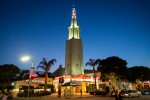Westwood has always faced legal hurdles to expanding its nightlife scene and providing students entertainment after 10 p.m.
Organizations like the North Westwood Neighborhood Council have supported the establishment of businesses in Westwood to improve the nightlife scene – such as Rocco’s Tavern and Broxton Brewery – to serve customers from dinnertime onward.
However, these businesses tend to operate individually and don’t create a larger identity for Westwood, said Andrew Thomas, executive director of the Westwood Village Improvement Association.
“What we don’t have is a synergy between businesses that are here that would create a scene,” Thomas said.
Compared to the current situation of Westwood, the neighborhood boasted a stronger nightlife scene in the past. Westwood of the 1970s and the 1980s served as an entertainment hot spot for Los Angeles and attracted more visitors from all over the city than any other area in LA, Thomas said.
In later decades, however, regions of LA such as Hollywood created more businesses and attracted large portions of Westwood’s regional audience, a phenomenon the neighborhood was not prepared to face.
“That competition absorbed (what) I believe to be a large portion of the regional people who would come,” Thomas said. “The other big hit is that there are regulations in the books that make it prohibited for us to have entertainment uses.”
The zoning guidelines for Westwood contains certain regulations that prevent the establishment of businesses such as bowling alleys and even the use of certain items in restaurants.
“You look at our zoning, and we can’t have pool tables,” Thomas said. “Why on earth can you not have pool tables?”
Some students said they feel like their options for going out are limited by the lack of entertainment venues in Westwood.
Sina Keramat, a first-year financial actuarial mathematics student, said he goes into Westwood around once a week to grab food with his friends but wishes the neighborhood had more entertainment options beyond restaurants and theaters.
“I would want to see more of a hangout place geared towards college students, like a recreation center with more games and not necessarily just sports,” Keramat said.
Pritish Patil, a first-year psychobiology student, said he frequents Westwood around four to six times a week and believes the neighborhood could use some more entertainment.
“I don’t know if entertainment is what (Westwood) is made for, but maybe a bowling alley or something like that would be nice,” Patil said.
Restrictions on venues in Westwood also extend to alcohol licenses and the establishment of bars. Michael Skiles, president of the NWWNC, said the previous Westwood Neighborhood Council implemented many requirements and conditions for businesses to obtain a Conditional Use Beverage permit, which is required for establishments to sell alcoholic beverages.
According to an application for the permit, conditions include the prohibition of any happy hour-like promotions and of dancing “on the premises at any time.” Additionally, the establishment must primarily be a full-service restaurant.
“Those conditions collectively insisted you could never have a bar or a club or anything approaching that in a traditional sense,” Skiles said. “The most exciting venue you could have would be one where you could order drinks with your meal.”
The Westwood Village Specific Plan, a legal document part of the LA General Plan, provides guidelines and regulations for the maintenance of current buildings and the construction of new buildings in the neighborhood. The Specific Plan was implemented Jan. 30, 1989, and has been amended twice in the past 30 years.
The Specific Plan, when first created, was tailored to a Westwood with far fewer UCLA students and a much smaller LA region. Despite the large growth of the UCLA and LA communities, the Specific Plan has not been adapted to accommodate a newer population, Skiles said.
“Changes should have happened decades ago,” Skiles said. “I don’t think that it has really been (Councilmember Paul Koretz’s) priority to get Westwood to the front of the line to get the attention of (the Department of City Planning).”
Koretz’s office did not respond to a request for comment.
Skiles said Koretz provided some support to change the plan but the bulk of the changes will happen years from now.
“We’ll probably be able to get a full-plan rewrite by about 2025 or 2026,” Skiles said. “In the meantime, (Koretz) has worked with a bid on one small Specific Plan change that encourages fast casual restaurants in Westwood.”
Although the plan has not been altered to allow for greater nightlife in Westwood in the past, Skiles said he hopes the bid will be passed by the end of the year with the support of the NWWNC.
